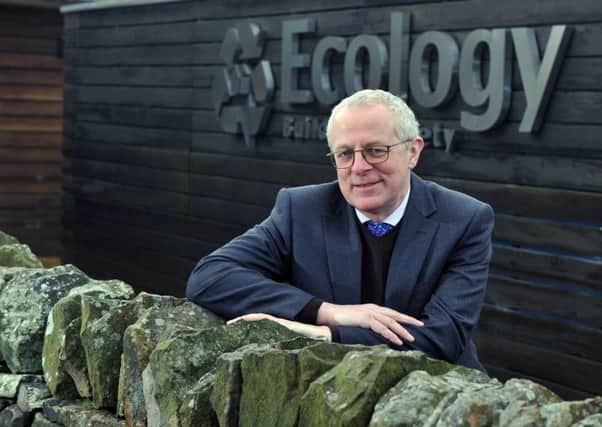Taking the green revolution to the bank


There had not been a new building society formed for some time and environmental awareness was at this stage still considered to be a niche interest.
However, in its 26-year history, the Silsden-based building society has been continually proved correct on a number of scores and today remains at the forefront of the green building movement.
Advertisement
Hide AdAdvertisement
Hide AdPaul Ellis, Ecology Building Society chief executive, recalls the atmosphere in the sector when the company was first established.
“The perception of others was that was incredibly high-risk and that it would not work,” he says. “I know that one of my predecessors was told that we were not expected to last beyond the first Christmas. But we are still here and most of those guys have disappeared.
“We are told by our partners that our intervention in the market really helped kickstart the green buildings project industry.”
Ecology Building Society’s main function is to help finance and sustain the green buildings sector. It is a message that is far from an affectation, as a visit to its headquarters at Silsden on the cusp of the Yorkshire Dales in West Yorkshire will prove.
Advertisement
Hide AdAdvertisement
Hide AdEvery aspect of the headquarters, from its construction to its car-park, is founded on environmental principles.
Mr Ellis says that the society currently has a membership in the region of 9,500, based mainly in Yorkshire, the South West, Wales and Scotland. “The only places we are relatively weak are the North East and London – London mainly due to fact that we do not do a massive amount of lending down there with house prices being what they are,” he says.
The founder members met through what was then called the Ecology Party and what is now the Green Party.
“Some of the founders were located in this area, but quickly found that, in the mortgage market conditions, it was a quite difficult to get a practical foundation to pursue this.
Advertisement
Hide AdAdvertisement
Hide Ad“The objective was to get land and older properties and renovate, often by themselves. The market did not work for this kind of finance, so we decided ‘let’s get in and build our own institutions’.”
The social climate that Ecology works in today has come a long way from when it was founded, with climate change denial now happily confined to the lunatic fringe of society (and, sadly, the White House).
However while the awareness of the need for environmental sustainability has come on leaps and bounds, the sector is an ever-changing and evolving one, making for a business model that is prepared to reflect and act upon these changes.
“Our members almost expect us to take that little bit of an extra risk,” says Mr Ellis. “They expect us not to have no account of risk, but they do expect us to take that forward view and try things out.
Advertisement
Hide AdAdvertisement
Hide Ad“We think that close underwriting allows us to mitigate the loss. The evidence of that is that we have had virtually no losses in our history and very low arrears.”
During our interview I suggest that Ecology Building Society is almost a disruptive influence, keeping larger players on their toes.
“We are trying to push the envelope and push the boundaries in the direction of higher standards and quality in building, as well as the adoption of new technologies.
“And I think we cannot say we can take all the credit for it. Like I said, when we started out there was massive scepticism but if you look at what has happened the world has caught up with us a little bit.”
Advertisement
Hide AdAdvertisement
Hide AdGiven the specialised nature of the work that Ecology Building Society does, the personnel it hires have to buy into its values, a process which Mr Ellis and his team lead from the top.
“We have fair pay policies. We are a living wage employer and always have been. We put a maximum pay cap in which is currently at 5:1. We expect that to filter out.
“Top salaries have got out of control. We think that gross inequality has its own environmental impact.
“Low budgets often make it difficult to make right environmental choices. Not just high pay, but low pay too.”
Advertisement
Hide AdAdvertisement
Hide AdEcology, somewhat predictably, witnessed an upsurge in interest following the financial crisis and the decline in fortunes of another ethically-focused business, the Co-op. Mr Ellis says growth prospects for the society look encouraging.
“I feel very fortunate to work for an organisation like this that does stick to its values and does try to be an engine of change. There is always something new to do.”